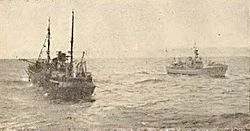Cod wars facts for kids
Quick facts for kids First Cod War |
|||||||||
|---|---|---|---|---|---|---|---|---|---|
| Part of the Cod Wars | |||||||||
 Coventry City and ICGV Albert off the Westfjords |
|||||||||
|
|||||||||
| States involved | |||||||||
| Commanders and leaders | |||||||||
|
|
||||||||
| Strength | |||||||||
|
|
||||||||
| Casualties and losses | |||||||||
| None | |||||||||
| a 3 by February 1960. | |||||||||
The Cod Wars were a series of disagreements between the United Kingdom and Iceland. These "wars" were not about fighting with soldiers, but about who had the right to fish in the North Atlantic. They happened in the 1950s and 1970s. The name "Cod Wars" might come from a funny play on words with "Cold War," because cod fish were at the center of the conflict!
Iceland called these events Þorskastríðin, meaning "the cod wars," or Landhelgisstríðin, which means "the wars for the territorial waters."
Contents
What Were the Cod Wars About?
The main reason for the Cod Wars was fishing rights. Iceland wanted to control a larger area of the ocean near its coast. This was to protect its fish stocks and support its fishing industry. The United Kingdom, however, had many fishing boats that had traditionally fished in those waters.
Iceland's economy relied heavily on fishing. They believed they needed to expand their fishing zones to prevent overfishing. Overfishing happens when too many fish are caught, making it hard for fish populations to recover.
The First Cod War: 1958–1961
The First Cod War started on 1 September 1958. Iceland passed a new law that expanded its fishing zone from 4 nautical miles to 12 nautical miles (about 22 kilometers) from its coast. A nautical mile is a unit of distance used at sea.
This new law meant that British fishing boats were no longer allowed to fish in areas they had used for a long time. The United Kingdom did not agree with Iceland's new rule. British fishing trawlers continued to fish in the disputed zone.
To protect their fishing boats, the British Royal Navy sent warships to the area. The Icelandic Coast Guard also patrolled the waters. There were many tense moments between the ships. However, no major battles or serious injuries occurred.
The First Cod War ended on 11 March 1961. An agreement was reached where the United Kingdom accepted Iceland's 12-nautical-mile fishing zone. In return, Iceland agreed to take any future disagreements to the International Court of Justice in The Hague.
The Second Cod War: 1972–1973
The Second Cod War began in September 1972. Iceland again decided to expand its fishing zone. This time, they declared an Exclusive Economic Zone (EEZ) that went even further out. An EEZ gives a country special rights over the exploration and use of marine resources, including fishing.
Iceland wanted to manage fishing in this larger area to prevent overfishing. They used their Icelandic Coast Guard to enforce their new rules. This led to incidents where Icelandic patrol ships would cut the nets of British fishing trawlers. This was done to stop them from fishing in the disputed waters.
In response, the British Royal Navy sent warships and tugboats. These ships were there to protect the British fishing crews. They tried to prevent the Icelandic ships from cutting nets. This created more tense standoffs at sea.
The Second Cod War ended in November 1973. A temporary agreement was signed between the two countries.
Why Did These Conflicts Happen?
Experts have looked at why the Cod Wars happened. For Iceland, the main reasons were economic and legal. They needed to protect their fishing industry, which was vital for their country. They also felt they had the legal right to control the waters near their coast.
For the United Kingdom, the reasons were also economic and strategic. Their fishing fleet relied on those waters for catches. They also wanted to maintain access to international waters.
Even though these "wars" were costly and risky for both sides, they kept happening. This shows how important fishing rights were to both countries.
What Happened After the Cod Wars?
The Cod Wars are often remembered when Iceland and the UK have other disagreements. They show how important fishing is to both nations.
In 2017, a special event took place. The crews of two ships involved in the Cod Wars met. These were the British trawler Arctic Corsair and the Icelandic patrol ship Odinn. They exchanged bells as a sign of friendship. This event showed how the cities of Hull (in the UK) and Reykjavík (in Iceland) had become friends after the conflicts. It was part of a project about the history between the two countries.
Images for kids
-
The incident between V/s Þór and the British MAFF ships Lloydsman and Star Aquarius, as seen from an Icelandic maritime surveillance aircraft
See also
 In Spanish: Guerras del Bacalao para niños
In Spanish: Guerras del Bacalao para niños
 | Kyle Baker |
 | Joseph Yoakum |
 | Laura Wheeler Waring |
 | Henry Ossawa Tanner |



